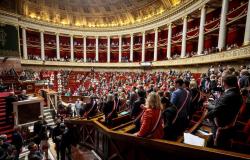Bruno Le Maire has his idea to update France’s economic bulletin. The lowering of the sovereign rating by one notch on Friday by the rating agency S&P Global Ratings due to the growing debt thus gave the Minister of the Economy new arguments to justify future reductions in public spending, while continuing to rule out tax increases.
While the oppositions seized the announcement of this downgrading to denounce the government’s poor budgetary management, the Minister of the Economy promised to “continue on exactly the same path without speeding up or slowing down”, in a video published Saturday on YouTube .
“I don’t plan to increase French taxes”
Very present in the media since Friday, the tenant of Bercy for seven years has once again ruled out any tax increase in 2025, on BFMTV… and even until 2027, he then said on LCI: “never, I don’t plan to increase taxes on the French.”
Bruno Le Maire places even greater emphasis on the need to reduce public spending, on the more than 450 billion euros in annual state spending. The minister highlighted the 10 billion savings decided at the start of the year and his desire to seek 10 billion additional cuts in 2024, also praising the work of Éric Woerth, who formulated proposals on Thursday intended to “restore trust” between the State and communities.
The drop in the rating by S&P (from AA to AA-) should not in itself lead to an increase in the rates at which France borrows, but it expresses the deterioration of public finances in France, which is still approaching a notch of the southern European countries, moving away from the more disciplined northern ones. For example, Germany has never lost its Triple A, now three notches above France.
A difficult political equation
To make S&P lie, which does not see France’s deficit falling below 3% of GDP in 2027, unlike the government which is aiming for 2.9%, it will be necessary to provide more guarantees. But, without an absolute majority in Parliament, the government will have to find compromises with the oppositions, a difficult exercise and one highlighted by the rating agencies due to “political fragmentation” in France. As the European elections on June 9 approach, the harsh exits of opposition figures, from LFI to the RN via LR, from Friday evening do not portend an imminent agreement.
On LCI, Bruno Le Maire once again justified, in the first person, the widening deficits since 2020 by expenses linked to the Covid crisis and the energy tariff shield. This argument “is not enough”, however objected the first president of the Court of Auditors Pierre Moscovici, interviewed in La Tribune Sunday “because comparable and equally costly policies have been carried out in all the countries of Europe”. “There is unfortunately a French specificity,” he regretted.






